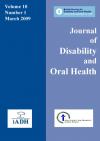Journal of Disability and Oral Health

- Cover Date:
- March 2009
- Print ISSN:
- 1470-8558
- Electronic ISSN:
- 1754-2758
- Vol:
- 10
- Issue:
- 1
Editorial
As we move through the months of the year 2009, the impact of the global economic downturn becomes more evident and nowhere is this felt more keenly than by those groups of people who are marginalised in our societies: the poor, elderly and disabled and so often, these in combination. Towards the end of 2008 it was evident that in some countries, Ireland, Sweden, Italy and Hungary at least, there were moves to cut benefits to people with disabilities as the economic gloom deepened. As resources become constrained it is also true that the services to marginalised groups become threatened: respite care, teaching assistants, rehabilitation programmes in prisons and comprehensive entitlement to free healthcare by those below the poverty line, which of course includes many people with disabilities. At a time when the economy is in crisis, there is an ominous sense that those who are vulnerable are left exposed by the consequences of increasing unemployment: heightened self-interest, increasing crime perpetuated towards such sectors of the population and an abandonment of the move towards equity and equality for disadvantaged groups. At a time like this, governments must hold true to their commitment to vulnerable populations by pursuing a reflationary approach to infrastructure, tax cuts, for example, so that poor, elderly and disabled people can access services and thus contribute to turning around the parlous state in which we now find ourselves. Oral health care services are not exempt from this. Many working with
patients will have for some time now felt the effects of revisions to service plans and budgets, revised downwards as the economic forecasts spelt out less money. In many countries of the world there will be a need for persuasive arguments to make a case for the retention of essential services for those with disabilities; in many countries enabling legislation should ensure that equity is delivered. It is worth pausing for a moment to underline the differences between equity and equality, terms so often used interchangeably but with distinct differences. What is relevant for people who are marginalised is equity in services, ensuring that services are targeted to allow those most disadvantaged to achieve optimal outcomes, whereas equality implies the same for all, equally distributed. However, equality in healthcare does not produce health for all. Health and socio-economic status are inextricably linked and poverty continues to contribute to poor health and chronic illness, keeping many populations below the poverty line. Health promotion, of which oral health is a part, is governed by the ethical principle of equity of access such that attainment of health should not be hampered for socio-economic reasons or poor health service delivery systems. Now more than ever we need to keep these principles in sight as the focus stays clearly on efficiencies and economies. Without this not only will the goals for 2010, the European Anti-Poverty Year, not be realised but the Millennium Development Goals for 2015 will not be achieved by those who stand to gain the most. June Nunn Editor.
To gain access to JDOH online: For BSDH members: Please go to www.jdohonline.org and Register. This will allow you to ensure your personal details are correct and to enable the creation of a password of your choosing.You will then receive an email confirming your details and that your account is active. You can then login and gain access to the online material. If you have any problems please email: support@shancocksltd.co.uk
For IADH members: Please go to www.jdohonline.org and Register. This will allow you to ensure your personal details are correct and to enable the creation of a password of your choosing.You will then receive an email confirming your details and that your account is active. Please then send an email to support@shancocksltd.co.uk requesting access to the online material and include ‘IADH Member’ in the subject of your email.
- Article Price
- £15.00
- Institution Article Price
- £
- Page Start
- 1
- Page End
- 1
- Authors
- June Nunn
Articles from this issue
- Title
- Pg. Start
- Pg. End
- A survey of the quality and quantity of Special Care Dentistry teaching, including Gerodontology, in dental schools of the United Kingdom and Ireland
- 3
- 10
- Oral health risk assessment of adults with learning disabilities: (2) Attitudes of dentists and care staff
- 18
- 24
- A preliminary investigation into aspects of oral health of Bangladeshi young adults with a learning disability in Tower Hamlets
- 25
- 35
- Management of exaggerated gag reflex using conscious sedation techniques in endodontic therapy - a pilot study
- 36
- 40
